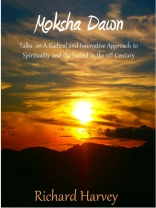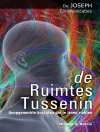Moksha Dawn is the second of a trilogy of books, containing the annotated transcripts of online talks given by Richard Harvey, a psycho-spiritual psychotherapist and spiritual teacher, between 2013 and 2014. The two series of online lectures titled The Silent Thunder Online Discourses and The Novena Teachings compile fourteen talks, which highlight a radical and innovative approach to spirituality and the sacred in the 21st century.
’Today we live in the age of individualism. But this age of the individual is far from straightforward. Obsessed as we are with ourselves, addicted as we are to our own self-importance, self-indulgence, and self-aggrandizement, we have the means, the power, and the strength in our possession. These are contained in our obsession and addiction to ourself. If we can only harness the power of obsession and addiction, and redirect it toward the Divine in no time at all we would be free!
But is this what we truly want? Do we—can we—truly weep for God, as Ramakrishna asks? Weeping for people and things, all of which will fade and pass, are we able to give heart-recognition to the deathless, to the eternal, to the Divine?
Do we give our attention appropriately and sufficiently to our spiritual awakening, arguably the only thing of ultimate value, the only thing that really matters? When and if we do, can we sustain our discipline and obedience to the higher calling?
Can we live the human life, the fully human life, the one in which we allow the Divine to manifest through our humanness—not in spite of our humanness—and live within the contradictions and paradoxes that bring us to the very edge of experience, the precipice of the sensible world, the reality and expression of eternity in the field of space and time?
The talks in Moksha Dawn are dedicated to Truth. They are not my opinion, my point of view, or my preference. Neither are they Absolute Truth in the strict sense or the word of God or the only way for you to follow. They are the fruit of the perspective of one human-divine, sacred life form, an individual awareness in the Divine total consciousness. The words appear out of the matrix of emptiness, out of the space between the in and the out breaths. They have been a joy for me to hear, to speak, to receive, and to communicate. In time these words will lapse into the great silence of mouna and all that we say and do and speak here will be a fading part of the universe. Like sand grains or notes of music, like autumn leaves or snowflakes, they will have been and then they will not have been. Let us pause for a moment. Are they merely human foibles, human failings, human gropings to understand? Or are they perhaps, fading, drying on the face now tears—the tears we shed weeping for the Divine?’












